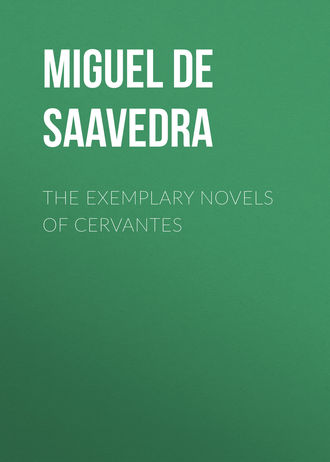 полная версия
полная версияThe Exemplary Novels of Cervantes
"It was the captain's intention to make for the island and take shelter under its northern shore, but in this he was disappointed; for such was the fury of the storm that although before it we had been making way continually for two days and nights, yet in little more than fourteen hours we saw ourselves again within six or seven miles of the island, and driving helplessly against it, not where the shore was low, but just where the rocks were highest and threatened us with inevitable death. We saw near us the other galley, on board of which was Leonisa, and all its Turk and captive rowers straining every nerve to keep themselves off the rocks. Ours did the same, but with more success than the crew of our consort, who, spent with toil, and vanquished in the desperate struggle with the elements, let fall their oars, and suffered themselves to drift ashore, where the galley struck with such violence that it was dashed to pieces before our eyes.
"Night began to close in, and such were the shrieks of those who were drowning, and the alarm of those on board our galley, that none of our captain's orders were heard or executed. All the crew did, was to keep fast hold of their oars, turn the vessel's head to the wind, and let go two anchors, in hopes to delay for a little while the death that seemed certain. Whilst all were in dread of dying, with me it was quite the reverse; for in the fallacious hope of seeing in the other world her who had so lately departed from this, every instant the galley delayed to founder or drive ashore was to me an age of agony. I watched every billow that dashed by us and over us, to see if they bore the body of the unfortunate Leonisa. I will not detain you, Mahmoud, with a recital of the tortures that distracted my soul in that long and bitter night; it is enough to say that they were such that had death come, it would have had little to do in bereaving me of life.
"Day broke with every appearance of worse weather than ever, and we found that our vessel had shifted its course considerably, having drifted away from the rocks and approached a point of the island. Setting all of us to work, both Turks and Christians, with renewed hope and strength, in six hours we doubled the point, and found ourselves in calmer water, so that we could better use our oars; and the Turks saw a prospect of going on shore to see if there were any remains of the galley that had been wrecked the night before. But Heaven denied me the consolation I hoped for in seeing in my arms the body of Leonisa. I asked a renegade, who was about to land, to look for it and see if it had been cast on the strand. But, as I have said, Heaven denied me this consolation, for at that moment the wind rose with such fresh fury that the shelter of the island was no longer of any avail to us.
"Seeing this, Fatallah would no longer strive against the fortune that so persecuted him. He ordered some sail to be spread, turned the prow to the sea and the poop to the wind, and himself taking the helm, let the vessel run over the wide sea, secure of not being crossed in his way by any impediment. The oars were all placed in their regular positions, the whole crew was seated on the benches, and no one else was seen on foot in the whole galley but the boatswain, who had lashed himself strongly amidship for his greater security. The vessel flew so swiftly that in three days and nights, passing in sight of Trapani, Melazo, and Palermo, she entered the straits of Messina, to the dismay of all on board, and of the spectators on shore. Not to be as long-winded as the storm that buffeted us, I will only say that wearied, famishing, and exhausted by such a long run, almost all round the island of Sicily, we arrived at Tripoli, where my master, before he had divided the booty with his partners, and accounted to the king for one-fifth part, according to custom, was seized with such a pleurisy that in three days it carried him off to hell.
"The king of Tripoli, and the alcayde of the Grand Turk, who, as you know, is heir to all those who die without natural heirs, immediately took possession of all Fatallah's effects. I became the property of the then viceroy of Tripoli, who a fortnight afterwards received the patent appointing him viceroy of Cyprus, and hither I am come with him without any intention of redeeming myself. He has often told me to do so, since I am a man of station, as Fatallah's soldiers informed him; I have never complied, but have declared that he was deceived by those who had exaggerated my means. If you would have me tell you my whole purpose, Mahmoud, you must know that I desire not to turn in any direction in which I may find any sort of consolation, but that the sad thoughts and memories which have never left me since the death of Leonisa may become so identified with my captive life that it may never afford me the least pleasure. And if it is true that continual sorrow must at last wear out itself, or him who suffers it, mine cannot fail to wear me out, for I am resolved to give it such free scope that in a few days it shall put an end to the wretched life I endure so unwillingly.
"This is, brother Mahmoud, my sad story; this is the cause of my sighs and tears; judge now if it is enough to draw them forth from my inmost vitals, and to engender them in the desolation of my afflicted heart, Leonisa is dead, and with her all my hope; and though whilst she lived it hung by the merest thread, yet, yet – "
Here the speaker's voice faltered, so that he could not utter another word, or restrain the tears which coursed each other down his cheeks so fast that they bedewed the ground. Mahmoud mingled his own with them; and when the paroxysm had somewhat abated, he tried to console Ricardo with the best suggestions he could offer; but the mourner cut them short, saying, "What you have to do, friend, is to advise me how I shall contrive to fall into disgrace with my master, and with all those I have to do with, so that, being abhorred by him and by them, I may be so maltreated and persecuted that I may find the death I so much long for."
"I have now," said Mahmoud, "experienced the truth of the common saying, that what is deeply felt is well expressed, though it is true that sometimes excess of feeling paralyses the tongue. Be that as it may, friend Ricardo, – whether your woes inspire your language, or your language exalts your woes, – you shall always find in me a true friend, to aid or to counsel, though my youth, and the folly I committed in assuming this garb, cry aloud that I am little to be relied on in this capacity. I will try, however, to prove that such a conclusion is unfounded; and though you do not desire either counsel or help, I will not the more desist from doing what your case requires, just as people give a sick man not what he asks for, but what is good for him. There is no one who has more power and influence in this city than my master, the Cadi; not even your own master, who comes to it as viceroy, will have so much. This being the case, I may say that I am the most powerful person here, since I can do what I please with my master. I mention this because it may be that I shall so contrive with him that you shall become his property, and being constantly with me, time will tell us what we had best do, both for your consolation, if you will or can be consoled, and to enable me to exchange the life I lead here for a better one."
"I thank you, Mahmoud, for the friendship you offer me," replied Ricardo, "though I well know that, do what you may, it will avail nothing. But let us quit this subject, and go to the tents, for, as I perceive, great numbers of people are coming forth from the city; no doubt it is the old viceroy who is quitting it to give place to my master."
"It is so," said Mahmoud. "Come then, Ricardo, and you will see the ceremony of the reception."
"Come on," said Ricardo; "perhaps I shall have need of you, if the superintendent of my master's slaves have missed me, for he is a Corsican renegade of no very tender heart."
Here the conversation ended, and the two friends reached the tents, just as the new pasha was coming out to receive his predecessor, Ali Pasha. The latter came attended by all the janissaries who have formed the garrison of Nicosia ever since the Turks have had possession of it, in number about five hundred. They marched in two divisions, the one armed with guns, the other with drawn scimetars. Arrived at the tent of Hassan, the new Pasha, they all surrounded it. Ali made a low obeisance to Hassan, who returned the salutation, but did not bow so low. Ali then entered Hassan's tent, and the Turks placed the new Pasha on a powerful steed, richly caparisoned, and led him round the tents, and up and down the plain; vociferating in their own language, "Long live Sultan Soliman, and Hassan Pasha, his representative!" which cry they frequently repeated, and each time louder and louder. This part of the ceremony being ended, they brought Hassan back to Ali's tent, where the two pashas and the cadi remained alone together for an hour to consult, as Mahmoud informed Ricardo, as to what was to be done upon some works which Ali had begun. Afterwards the cadi appeared at the door of the tent, and proclaimed in Turkish, Arabic, and Greek, that all who desired to crave justice or make any other appeal against Ali Pasha, might now enter freely, for there was Hassan Pasha, sent by the Grand Signor to be viceroy of Cyprus, who would accord them all reason and justice.
In conformity with this permission the janissaries opened a passage to the door of the tent, and every one entered who pleased. Mahmoud made Ricardo go in along with him, for being Hassan's slave his entrance was not opposed. Several Greek Christians and some Turks appeared as appellants, but all upon such trifling matters, that the cadi despatched most of them without the formality of written declarations, rejoinders, and replications. It is, in fact, the custom of the Turks that all causes, except those which relate to marriage, shall be immediately and summarily decided, rather by the rules of common sense than of legal precedent; and among these barbarians (if such they are in this respect) the cadi is the sole judge in all cases, cuts short the pleadings, gives sentence in a breath, and there is no appeal from his decision. Presently a khawass (that is to say, a Turkish alguazil) entered and said that a Jew stood without, at the door of the tent, with a most beautiful Christian maiden for sale. The cadi gave orders to admit him. The khawass withdrew and immediately returned, accompanied by a Jew of venerable appearance, who led by the hand a young woman clothed in the Moorish dress, which became her so well that the most richly arrayed women of Fez or Morocco could not be compared with her, though in the art of adorning themselves they surpass all the other women of Africa, not excepting even those of Algiers, with all their profusion of pearls.
The face of the female slave was covered with a mask of crimson taffety. On her naked ankles she wore two rings, apparently of pure gold; and two others, set with large pearls, on her arms, which shone through the sleeves of a transparent camisole. Her whole dress was rich, gay, and graceful. Struck by her appearance, the first thing the cadi and the pashas did, was to bid the Jew make the Christian uncover her face. She did so, and disclosed a countenance which, like the sun bursting through thick clouds which have long obscured it, dazzled the eyes and gladdened the hearts of the beholders. But on none did that marvellous light produce such an effect as on the woe-worn Ricardo, for he saw before him no other than his cruel and beloved Leonisa, whom he had so often and with such bitter tears bewailed as dead.
At the unexpected sight of such unparalleled loveliness, Ali felt his heart transfixed; Hassan's was pierced with as deep a wound; nor did the cadi's escape scatheless, but, even more deeply smitten than the two pashas, he could not take his eyes off the Christian's face. All three were seized at the same moment with an absolute determination to possess her; and without stopping to inquire how, or where, or when, she had come into the hands of the Jew, they bade him name her price. Four thousand doblas, he replied. The words were no sooner out of the Jew's mouth than Ali Pasha said he would give the price, and that the Jew had only to go to his tent to fetch the money. Hassan Pasha, however, who looked as if he had no mind to lose her, though she were to cost him his life, interposed and said, "I myself will give the four thousand doblas demanded by the Jew, though I would not interfere with Ali's bargain or oppose his wishes, were I not compelled by motives the imperious force and obligation of which he will himself acknowledge. This exquisitely beautiful slave is not for us, but for the Grand Signor alone, and therefore I say that I purchase her in his name. Let us see now who will be so bold as to dispute the purchase with me."
"That will I," replied Ali, "for it is for that very purpose I buy her of the Jew; and it suits me the better to make the present to his Highness, as I have the opportunity of taking her to Constantinople in a few days, and thus winning the favour of the Sultan; for being, as you see, Hassan, a man without employment, I must seek means for obtaining one; whereas, you are secure in that respect for three years, since to-day you enter upon the government of this rich realm of Cyprus. On these grounds, and as I was the first to offer the price demanded for the slave, it stands to reason, Hassan, that you should yield her to me."
"The satisfaction I shall feel in purchasing and sending her to the Sultan," said Hassan, "is so much the greater, as I shall do it without being prompted by any motives of interest whatever. And as for a convenient means of sending her to Constantinople, she shall go thither in a galley manned only by my own slaves."
Ali now started up in wrath, and, clutching his scimetar, cried out, "Since we both intend the same thing, Hassan, namely, to present this Christian to the Grand Signor, and since I was the first purchaser, reason and justice require that you should leave her to me; if you will not, this blade in my hand shall defend my right, and punish your audacity."
The cadi, who had been closely watching this contest, and who was himself no less inflamed with desire than either of the pashas, bethought him how he might remain possessor of the prize, without giving any cause to suspect his insidious designs. Rising therefore to his feet, he stepped between the two angry pashas. "Be quiet, Hassan," he said; "calm yourself, Ali; here am I who can and will arrange your differences in such wise that you shall both have your intentions fulfilled, the Sultan shall be gratified as you desire, and shall be under obligations to you both alike for your loyal and acceptable homage."
The two pashas submitted at once to the cadi, as they would have done even had the terms he imposed appeared harder to them, such is the respect which is paid to their elders by those of that accursed sect. The cadi then continued his address to them. "Ali," said he, "you say that you want this Christian to present her to the Grand Signor; and Hassan says the same. You allege that, having been the first to offer the price required, she ought to be yours; but Hassan denies this; and though he does not know how to assign valid grounds for his claim, yet I find that he has the same as yourself, namely, the intention, which doubtless must have arisen within him at the same time as within yourself, to purchase the slave for the self-same purpose; only you had the advantage of him in being the first to declare yourself. This, however, is no reason why he should be out and out defrauded of the benefit of his good-will, and therefore I am of opinion that it will be well to arrange matters between you in this wise: let the slave be bought by you both; and since she is to belong to the Grand Signor, for whom you buy her, it will be for him to dispose of her. Meanwhile, you Hassan shall pay two thousand doblas, and you Ali another two thousand, and the slave shall remain in my custody, so that I may send her in the name of you both to Constantinople, and thus I too shall not be without some reward for my presence and aid on this occasion. Accordingly, I undertake to send her at my own cost in a style worthy of the great sovereign to whom she is to be presented; and I will write to the Grand Signor a true account of all that has occurred here, and of the good-will you have shown in his service."
The two enamoured pashas could find no pretext for gainsaying this decision; and though it thwarted their desires, they were constrained to submit, each of them comforting himself with the hope, however doubtful, that he would succeed at last. Hassan, who was to remain viceroy of Cyprus, resolved to make such presents to the cadi as would induce him to give up the slave. Ali formed other plans, and as he flattered himself that he should carry them into successful operation, they both professed themselves satisfied, and paid the Jew two thousand doblas each on the spot. The Jew then said that he had sold the slave, but not the clothes she wore, which were worth another two thousand doblas; and this indeed was true, for her hair which she wore partly loose on her shoulders, and partly braided on her forehead, was most gracefully interwoven with strings of pearls; her bracelets and anklets too were set with very large pearls, and her green satin robe was heavily flounced and embroidered with gold. In short, all agreed that the Jew had set a low price on the dress, and the cadi, to show himself no less liberal than the two pashas, said that he would pay for it, that the slave might appear before the Grand Signor as she then stood. The two competitors agreed in approving of this, each of them believing that slave, dress, and all would soon be his own.
It is impossible to describe Ricardo's feelings, when he saw the treasure of his soul thus put up for sale, and found that he had regained it only to lose it more cruelly. He knew not whether he was asleep or awake, and could not believe his own eyes; for it seemed incredible that they should have so unexpectedly before them her whom he had supposed to have disappeared for ever. "Do you know her?" he whispered in Mahmoud's ear.
"No! I do not," was the reply.
"Then I must tell you that it is Leonisa."
"What do you say, Ricardo?" exclaimed Mahmoud.
"I say it is Leonisa."
"Say no more; fortune is proving your friend, and all is turning out for the best, for she is to remain in my master's custody."
"What think you? Shall I place myself where I may be seen by her?"
"By no means, lest you give her a sudden shock; nor must you let it be known that you have seen her, for that might disconcert the plan I have in view."
"I will do as you advise," said Ricardo, turning away his eyes, and carefully avoiding those of Leonisa, which were meanwhile bent upon the ground. Presently the cadi went up to her, and taking her by the hand, delivered her to Mahmoud, ordering him to take her into the city and give her up to his lady, Halema, with directions to keep her as a slave of the Grand Signor. Mahmoud obeyed and left Ricardo alone, following with his eyes the star of his soul, until it disappeared behind the walls of Nicosia. He then went up to the Jew, and asked him where he had bought that Christian slave, or how he had become possessed of her. The Jew replied that he had bought her in the island of Pantanalea, of some Turks who had been shipwrecked there. Ricardo would have pursued his inquiries, but the Jew was called away to give the pashas the very same information which Ricardo so much longed to obtain.
During the long walk from the tents to the city Mahmoud conversed with Leonisa in Italian, and asked her whence she came. She replied that she belonged to the illustrious city of Trapani, and that her parents were noble and wealthy, though as for herself she was utterly unfortunate. Mahmoud then asked her if she knew a gentleman of birth and fortune in that city, named Ricardo. On hearing that name a sigh escaped her that seemed to come from the bottom of her heart. "I know him," she replied, "to my sorrow."
"Why to your sorrow?"
"Because it was to his sorrow that he knew me, and for my misfortune."
"Perhaps," said Mahmoud, "you may also know in the same city another gentleman of very amiable disposition, the son of very wealthy parents, and himself a person of great spirit, liberality, and discretion. His name is Cornelio."
"Him too I know, and of him still more than Ricardo I may say that I know him to my sorrow. But who are you, sir, who know these gentlemen and inquire of me respecting them? Doubtless, Heaven, in compassion for the trouble and mischances I have undergone, has sent me to a place where, if they do not cease, at least I may find a person to console me for them."
"I am a native of Palermo," said Mahmoud, "brought by various chances to wear this garb, and to be in appearance so different from what I am in my secret soul. I know the gentlemen in question, because not many days ago they were with me. Cornelio was captured by some Moors of Tripoli, and sold by them to a Turk who brought him to this island, whither he came to trade, for he is a merchant of Rhodes, and so highly satisfied was he with Cornelio, and such was the confidence he reposed in his truth and integrity, that he entrusted him with his whole property."
"He will be sure to take care of it," said Leonisa, "for he takes very good care of his own. But tell me, señor, how or with whom did Ricardo come to this island?"
"He came," said Mahmoud, "with a corsair who had captured him in a garden on the coast near Trapani, and along with him a damsel, whose name I never thought of asking, though the corsair often spoke to me in praise of her beauty. Ricardo remained hero some days with his master until the latter went to visit the tomb of Mahomet, which is in the city of Almedina,77 and then Ricardo fell into such a sickness that his master left him with me, as being my countryman, that I might take care of him until the return of the pilgrim to Cyprus, should that happen; or else I was to send Ricardo to Constantinople, when his master should advise me of his arrival there. But heaven ordered it otherwise; for the unfortunate Ricardo died in a few days, always invoking to the last the name of one Leonisa, whom he had told me he loved more than his life and soul. She had been drowned, he said, in the wreck of a galley on the coast of the island of Pantanalea; and he never ceased to deplore her death till his grief destroyed him, for that in fact was the only malady I discovered in him."
"Tell me, señor," said Leonisa, "in the conversations you had with the other young man, did he sometimes name this Leonisa? Did he relate the manner in which he and she and Ricardo were captured?"
"He did name her," replied Mahmoud, "and asked me if there had been brought to this island a Christian of that name, of such and such appearance; for if so he should like to ransom her, provided her owner had been undeceived as to his notion that she was richer than she really was, or should it chance that having enjoyed her, he held her in less esteem. If her price did not exceed three or four hundred crowns, he would pay it gladly, because he had once had some regard for her."
"It must have been very little," said Leonisa, "since it was worth no more than four hundred crowns. Ricardo was more generous. Heaven forgive her who was the cause of his death, and that was myself; for I am the unhappy maiden whom he wept as dead, and God knows how I should rejoice were he alive, that I might repay him by letting him see how I felt for his misfortunes. Yes, señor, I am the little loved of Cornello, the truly wept of Ricardo, whom various chances have brought to the miserable state in which I now am; but through all my perils, by the favour of Heaven, I have preserved my honour unsullied, and that consoles me in my misery. I know not at this moment where I am, nor who is my master, nor what my adverse fates have determined is to become of me. I entreat you, therefore, señor, by the Christian blood that flows in your veins, that you will advise me in my difficulties; for though they have already taught me something by experience, yet they are so great and never-ending, that I know not what to do."
Mahmoud assured her he would do what he could to help her to the best of his understanding and his power. He acquainted her with the nature of the dispute there had been between the pashas concerning her, and how she was now in the keeping of his master the cadi, who was to send her to Constantinople to the Grand Turk Selim; but that he trusted that the true God, in whom he, though a bad Christian, believed, would dispose of her otherwise. He advised her to conciliate Halima, the wife of his master the cadi, with whom she was to remain until she was sent to Constantinople, and of whose character he gave her some details. Having given her this and other useful counsel, he arrived at the cadi's house, and delivered her over to Halima along with his master's message.









